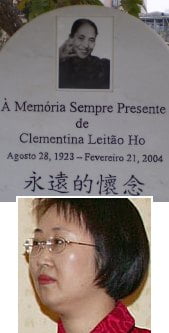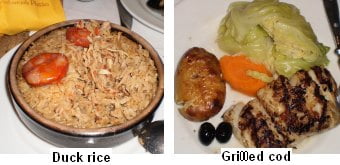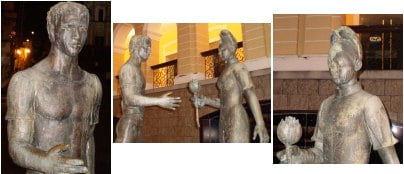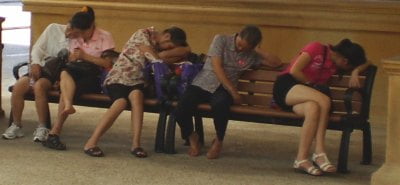According to the South China Morning Post, the Hungry Ghosts festival is being driven out of Central by the Urban Renewal Authority’s scheme to eradicate the entire neighbourhood and replace it with high-rise McDonalds and empty luxury apartments for Mainlanders. In Macau on Saturday evening, on the other hand, I found the tradition alive and well – not to say disruptive – with every sidewalk in the grungier districts being taken over by squatting figures burning offerings and leaving food and drink for wandering lost souls. The authorities place metal boxes on street corners for the purpose, but residents know this won’t work: they need to set the money and incense alight right on their doorstep if they are to keep the restless spirits away from their homes.
 There wouldn’t be a problem with disgruntled ghouls in the first place if people took better care of their deceased loved ones. The ultimate way to do this is to give them a freehold grave, but such plots are extremely rare in the cramped ex-Portuguese enclave. Casino king Stanley Ho’s first wife apparently has one. And so does the father of the city’s number-two official, Secretary for Administration Florinda da Rosa Silva Chan. Scurrilous gossips and malcontents claim that Florinda acquired this privilege in an underhand manner. She says it was all above board; it was another member of her department who abused power to get such a plot, and anyway he didn’t, or something. So that’s all OK.
There wouldn’t be a problem with disgruntled ghouls in the first place if people took better care of their deceased loved ones. The ultimate way to do this is to give them a freehold grave, but such plots are extremely rare in the cramped ex-Portuguese enclave. Casino king Stanley Ho’s first wife apparently has one. And so does the father of the city’s number-two official, Secretary for Administration Florinda da Rosa Silva Chan. Scurrilous gossips and malcontents claim that Florinda acquired this privilege in an underhand manner. She says it was all above board; it was another member of her department who abused power to get such a plot, and anyway he didn’t, or something. So that’s all OK.
Florinda is also in the news because of a proposed law granting officials legal aid if they get involved in court cases arising from their duties. The chatterers see this as another threat to Macau’s ever-tenuous press freedoms: top officials will be able to sue reporters for defamation at public cost. Florinda says ‘no way, we love criticism’. There are two reasons to believe her. First, most of the local papers are subsidized by the government (and report her denials and everything else pretty much without question). Second, the top officials are mostly multi-millionaires anyway and hardly need taxpayers’ funds to hire lawyers.
Meanwhile, casino operators here are complaining about being forced to hire morose, uneducated and unsightly middle-aged local people with no clue about customer service to work in food outlets and other facilities formerly staffed by happy, multilingual young Filipinos and Nepalese (of whom plenty are still around). A quick stroll through one of the vast glitzy gambling palaces confirms that the hire-locals policy is having an effect, and the employers have a point. Through no fault of their own, the older natives – laid-off factory workers, presumably – ruin the ambience. Amid all the glamour-fantasy, their grumpy presence is an intrusion of the reality outside: a city being pimped out to outsiders with dirty money to enrich Stanley, Florinda and half a dozen others.
A quick comparison of two Portuguese eateries: Restaurante Platao and Boa Mesa, a few yards from one another on Travessa de Santo Domingo, just off the historic square. The former is cramped with tiny tables, waitresses squeezing past and elbows, as in Hong Kong’s Soho or Lan Kwai Fong where they have ‘covers’ not people coming in to dine; the latter is spacious and you can stretch your legs out. The former is an old building with courtyard and flashy décor; the latter is a room with some posters on the wall. The former has a philosophy; the latter has a big black plastic pig out front. The former is associated with an ex-chef of colonial governors; the latter is run by an ethnic Chinese from Mozambique. The former is Soho-expensive; the latter is cheaper. The food is excellent in both (so no comparison with Soho in that respect at least). People cram themselves into the former because glossy magazines say it’s famous, and why bother thinking for yourself?
Macau’s nationalists and patriots are fuming over the statue of a boy and girl at the bottom of the steps leading up to Saint Paul’s. I see an ugly bit of Continental European-style contemporary street art, stained with bird droppings. Apparently, in reality it is a Chinese girl offering a Portuguese (don’t ask how they can tell) boy a flower to represent voluntary, if not adoring, submission of the motherland to colonial oppression and exploitation. (Probably some gender stereotyping in there, too.) So now we know. This is what the locals believe. Mainland tourists are too busy being forced to buy things in shops and collapsing with fatigue…




Buy things? They’ve lost their last fen on the blackjack tables and can’t do anything else but wait for their tourbus to take them home
You will be able to tell what is what on the statues as some parts will in time become shinier from constant, erm, rubbing by visitors.
Bun Bun, it’s typically baccarat for the plebs and roulette for the cashed-up. To the mainland palate, blackjack doesn’t quite leave enough to chance.
Pai Gow looks very much like a home grown game though I’ve never worked out how it’s played. For pure random chance, you can’t be dai sai – dice in the air and see whether the numbers land big or small
True, true. I’ve tried to defeat dai sai and been burnt – this foreigner shan’t meddle in those sorts of Chinese affairs again.
Just want to express my profound sympathy for that gunman in Manila. Alone on a bus with twenty Hong Kong tourists. The horror, the horror…
The beauty of legal aid is that it is a bottomless pit, whereas even a millionaire’s funds will soon be exhausted by any half-canny lawyer (unless his willpower gives out first). Large corporations laugh in the face of lawsuits from millionaires. It’s the penniless (or, in the case of Macau’s officials, not-so-penniless) legal aid recipients with nothing to lose who strike fear into their cold capitalist hearts.